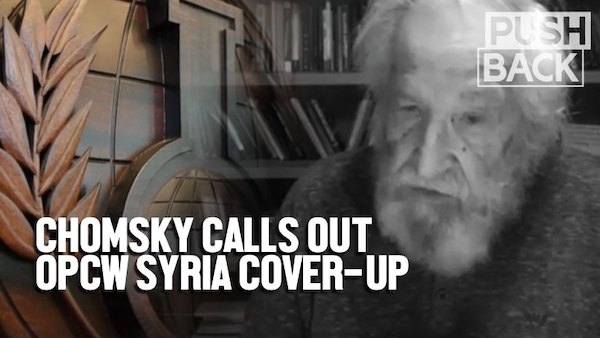In his first public comments on the OPCW’s Syria cover-up scandal, Noam Chomsky criticizes the chemical watchdog for suppressing, under U.S. pressure, evidence that undermined the pretext for the U.S.-led bombing of Syria in April 2018. The censorship recently extended to the UN Security Council, where the U.S., UK, and France blocked former OPCW Director General José Bustani from testifying in support of the inspectors whose findings were kept from the public.
“What happened certainly arouses very severe suspicions… The United States and its allies want the evidence provided by some of the top inspectors to be banned,” Chomsky says.
We won’t discuss it, we won’t see if they’re right or wrong, we’ll just ban it. Well it tells a reasonable person something: they want to ensure that it’s not discussed, meaning they have no confidence in their own conclusions, meaning the U.S. bombing of Syria was undertaken on false presences. Whether their report is correct or not, I have no judgment. But what we do know is the United States and its allies don’t want it discussed… And the OPCW is capitulating to this, which is pretty shocking.
Guest: Noam Chomsky, linguist, author and political dissident.
This is an excerpt of a longer interview with Noam Chomsky. Watch it in full here.
TRANSCRIPT
AARON MATÉ: Another issue that speaks to the U.S. trying to silence defiance on the world stage has to do with this scandal unfolding at the OPCW. Last week at the UN Security Council, the U.S. and its allies voted to block José Bustani–the OPCW’s first Director General–from speaking. He had come to testify in support of two OPCW inspectors who challenged the cover-up of their investigation in Syria. They found evidence that pointed to this attack–this alleged attack in Douma in April 2018–being staged on the ground, and not carried out by the Syrian government. Their findings would have undermined the rationale for the U.S.-led bombing of Syria under Trump that same month. [But] their evidence was censored.
So Bustani came to speak in support of them but the U.S. and their allies blocked him from speaking. You’ve previously signed a petition in support of these inspectors. Just with the few moments we have I’m wondering your thoughts on why this story is important and why you think these inspectors should be heard
NOAM CHOMSKY: Well what happened certainly arouses very severe suspicions. The OPCW came out with a report blaming Syria for a chemical attack. Reporters like Robert Fisk and others thought it was pretty shady at the time, but didn’t know.
Then came the bombshell. Some of their leading investigators–top ones–came out and said that their own analyses undermined the OPCW reports and that they were being silenced. Okay, that asks the question. Then comes a long series of efforts to silence them up to what you just described.
The United States and its allies want the evidence provided by some of the top inspectors to be banned. We won’t discuss it, we won’t see if they’re right or wrong, we’ll just ban it.
Well it tells a reasonable person something: they want to ensure that it’s not discussed, meaning they have no confidence in their own conclusions, meaning the U.S. bombing of Syria was undertaken on false presences. Okay, that’s got to be covered up.
Whether their report is correct or not, I have no judgment. But what we do know is the United States and its allies don’t want it discussed. They don’t want the evidence discovered by the some of their top inspectors to be looked at. And the OPCW is capitulating to this, which is pretty shocking, because they’ve been trusted on other things. If they’re going to capitulate on this why should they be trusted on anything else?
AARON MATÉ: And the irony too of them blocking José Bustani who, 18 years ago, was ousted [at the OPCW] under pressure from the Bush administration because he stood in the way of the Iraq war.
NOAM CHOMSKY: Exactly. Some more power plays. [Mike] Pompeo has carried it to new heights than what he just carried off at the Security Council. But it’s not new–you’re right, it goes far back in U.S. policy.

